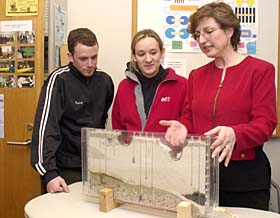For more archives, go to the Advance Archive/Search Page.
Environmental Engineer Draws
Students To Field With Humor
In 1980, Nelly Abboud left civil war-torn Lebanon and arrived in the United States with barely any English. But she came with a strong philosophy, a sense of humor, and a will to succeed.
 |
|
Nelly Abboud, associate professor and director
of the undergraduate environmental engineering program, shows Eric Kenney
and Sandrine Baun, engineering students, how a groudwater contamination model
works. Photo by Dollie Harvey
|
Today, she's an associate professor and director of UConn's undergraduate environmental engineering program. Her English, French, and Arabic are all flawless, and her philosophy and humor remain intact.
Visitors to her web page find the usual course descriptions and listings of academic credentials, along with some surprises: a link to jokes about engineers and a lively PowerPoint presentation she uses to introduce young people to the world of engineering.
Her philosophy, adapted from the American Lebanese poet Khalil Gibran, emphasizes the value of lifelong learning and the goodness that comes from mentoring young people. It's a way of life that she follows daily.
Abboud knows engineering is not a field normally associated with a good laugh, but she finds that a bit of humor can break the ice and inspire students who might be put off by a more traditional approach, or a wall full of equations.
"Engineering can be fun," she says. "We're a profession that takes on lots of challenges and it's hard work, but fun too."
In her classes at the Waterbury and Storrs campuses, and in outreach activities at high schools, career fairs, and the CPTV Science Fair Expo, she shows students how engineering literally touches all aspects of life. She believes the profession can appeal to young people who tend to be idealistic and want to make the world a better place.
"I don't just want to create engineers; I want to create engineers who are successful and contribute to the community," she says. She has a special interest in attracting young women to the field and says they often react positively to her presence and her achievements in a male-dominated field.
"I look to her as my role model," one former student said. "She possesses a strong and confident character. She encourages us to improve things in our environment and society, and tells us to reach for our goals and be curious, creative, and confident."
A civil engineer who received her undergraduate, master's, and doctoral degrees from the University of Delaware, Abboud focuses in her teaching and research on technologies relating to water pollution and the ways liquids and solids can be separated in various environments. She has been extensively published around the world; has chaired or presented at dozens of professional conferences; and has edited papers for a long list of publications with names like Transport in Porous Media Journal and Journal of Colloid & Interface Science.
Her research in filtration and related sciences has also been rewarded with grants and financial support from UConn and outside organizations. But the recognition she counts the highest is the Outstanding Teaching Award she received from the School of Engineering last year, a tribute to her relationship with students.
"I use a hands-on approach in my teaching," Abboud says. "I don't throw theory at my students. Instead, I give them a problem and let them see the variables that lead to solutions x, y, or z."
Her area of study involves the science governing the process of filtration in such liquids as petroleum products or ground water, or even, as she tells her students, the juice they drank at breakfast. Her teaching interests include water quality engineering, numerical methods in engineering, computer programming and graphics, applied mechanics, and physics. In a research project she set up several years ago, she and three students studied a wastewater treatment plant in Lebanon to determine the best way to recycle the water.
Her work in Lebanon earned her the nation's equivalent of the Congressional Medal of Honor, the National Order of the Cedar Medal. It was presented by Lebanon's president.
Abboud's research is applicable in oil well drilling operations, water and wastewater treatment, ground water phenomena, and solid-liquid separation processes. Her research involves such topics as how bacteria and particles move in liquid, and the porosity of various materials. The issues she and her students study often relate directly to everyday life and human health and well-being.
Abboud originally majored in biology but switched to engineering. "I chose academia," she says, "because it allowed me to implement my philosophy of life, mentoring young people and thus contributing to the wealth of the nation. I want to be a mentor and role model to the younger generation. I want to make a positive difference in the world."

